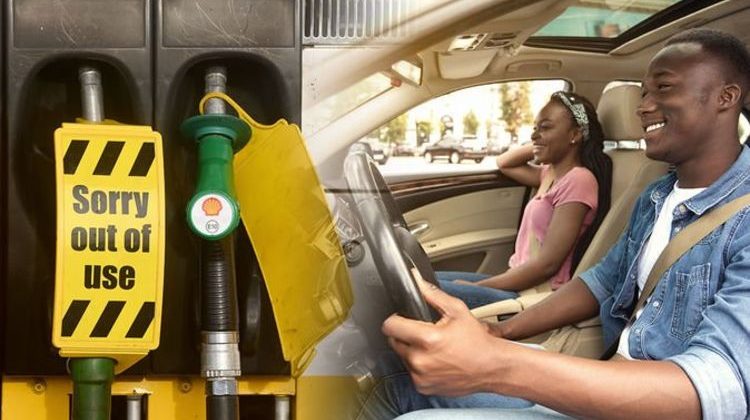BBC Newsnight estimate shows petrol rush to end by weekend
We use your sign-up to provide content in ways you’ve consented to and to improve our understanding of you. This may include adverts from us and 3rd parties based on our understanding. You can unsubscribe at any time. More info
Britons “panic buying” petrol have been urged to resist the temptation to stock up on fuel. A rush to the pumps began last week after the HGV driver shortage made it difficult for petrol deliveries to go ahead at the necessary frequency.
As a result, reports suggested that over the weekend, up to 90 percent of garages were unable to keep up with demand and thus left with no fuel for long periods of time.
Prime Minister Boris Johnson has told Britons to only fill up their tanks “if you really need it”.
Meanwhile, the AA has reassured Britons there is “no shortage” of actual fuel and is begging drivers not to overfill their cars.
AA president Edmund King said: “There is no shortage of fuel and thousands of forecourts are operating normally with just a few suffering temporary supply chain problems.
“Fridays and the weekend always tend to be busier on forecourts as drivers either combine filling up with shopping runs, prepare for weekend trips or refuel for the start of the new working week.”
The supply chain disruption is likely to continue until the winter months, which is why it is vital Britons only fill up when absolutely necessary.
According to Ben Newman, the resident car expert working with findandfundmycar.com, there are some ways drivers can help by making their fuel go further.


How can I make my petrol last longer?
Closing the petrol cap
Closing the petrol cap might sound like an obvious thing to do, but if it isn’t as tight as necessary, drivers could end up losing fuel at a faster rate than they might expect.
Mr Newman explained: “Ensuring your petrol cap is closed really tight can help your car gain some extra mileage and go that little bit further.
“Petrol is a liquid, and when a liquid gets too hot, it’ll evaporate into the air.
“Think about it: if your cap is extremely tight, then the petrol will have nowhere to go.
“This ensures that your fuel stays in the car rather than seeping through the cap and into the air.
“So, when you next head out to your car, double-check that the cap is as tight as it can be.”
DON’T MISS
Drivers warned over legal parking loophole which could ‘irritate’ [COMMENT]
New number plate rule comes into effect today [INSIGHT]
Petrol price warning: How much fuel could cost due to panic buying [CHART]
Make the car lighter
People often keep all manner of items in the boot of their car. In some cases, these can be useful, such as emergency items in the event of an unexpected break down.
However, regularly carrying too many items in your car’s boot can be detrimental to petrol usage.
Mr Newman said: “The heavier the vehicle, the more fuel it uses.
“I’m not suggesting that everyone swaps their bigger cars for something smaller, but what I’m suggesting is taking out any junk in your car that isn’t needed for that specific trip.
“If you’ve got a boot full of stuff that you’re not using, and your car is fitted with bike racks and a towing vehicle, then empty the boot and leave the extra kit at home to make your car lighter.”

Check your tyres
Mr Newman told Express.co.uk: “Tyre rolling resistance, which is the effort required to keep a tyre rolling as you’re driving, counts for around 15 percent of all fuel consumption.
“This consumption is why it’s important to keep your tyre pressure high.
“Not only does it mean you’ll be driving safely, but you’ll also be saving fuel.”
You can check your tyre pressure using a dedicated pressure gauge.
A number of garages and petrol stations offer free tyre-checking services for cars. They also offer a place to fill up your tyres if they are low.
Tyre pressure gauges can also be bought for home use from mechanics and garages, though it is important to use a gauge that uses the same unit of measurement as the guidelines given for your car.
Turn your engine off
Although your car may not be moving while queueing or in a traffic jam, leaving your engine running still guzzles petrol, according to Mr Newman.
He explained: “If you’re stuck in traffic, or you’ve been stationary for longer than a minute or so, then turn your engine off.
“Leaving your car running even while not moving will burn through fuel quite quickly. Not only that, but it’s also bad for the environment.
“If you can see that the traffic in front of you is at a standstill, then don’t wishfully think that it’ll start speeding up soon – turn the engine off and wait until you see some movement.”
Take it easy on the pedal
Bad driving habits should be avoided for safety and in order to abide by driving laws.
However, it seems certain bad habits could also be negatively impacting how much fuel your car goes through.
The car expert told Express.co.uk: “Bad driving habits can seriously affect how much fuel you use and it’s the biggest contributor to wasted petrol and diesel.
“Speeding, braking and rapid acceleration waste both petrol and diesel, so it’s important that you drive sensibly – no sudden brakes and no sudden acceleration.
“Drive less like a race car driver, and more like a road driver.”
Source: Read Full Article
